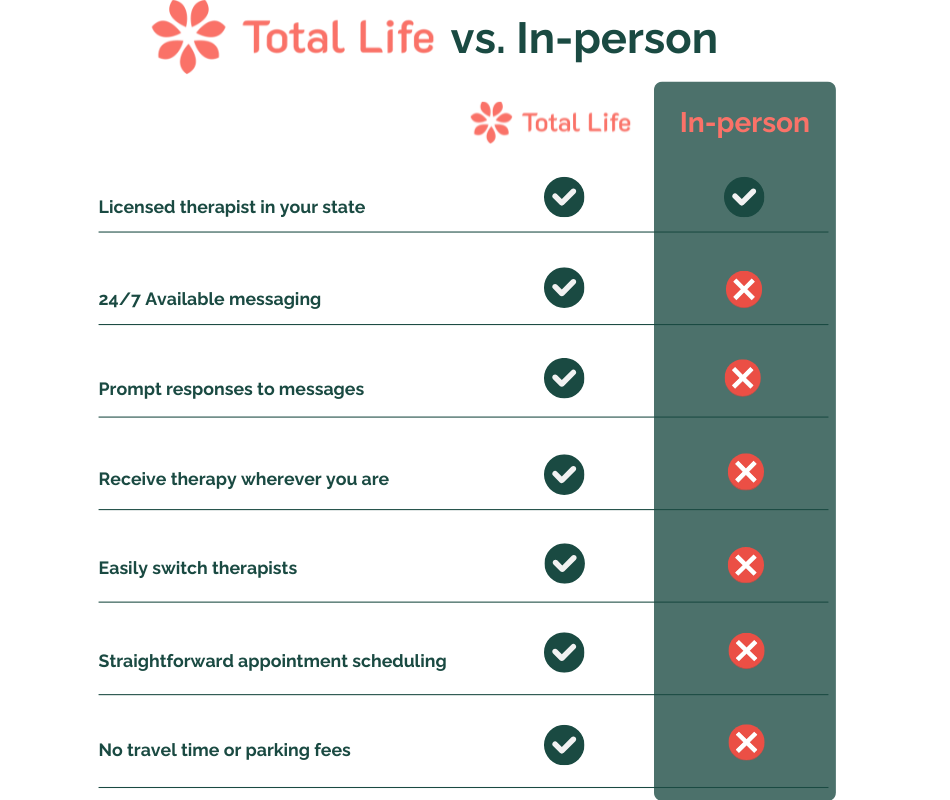DON’T TAKE OUR WORD FOR IT







What Our Clients Have to Say
“I recently started using Total Life for therapy and I have been blown away by the level of care and compassion that I have received. My therapist and the team at Total Life truly seem to care about my well-being.”
Total Life Client
Joined December 2023
“As a senior, it was difficult to find resources that cater to my experience, Total Life does. I feel like I am in good hands and can trust that my therapist will help me work through any challenges I may be facing.”
Total Life Client
Joined March 2024
“My experience with Total Life has been nothing short of amazing. I was hesitant to try online therapy, but the team at Total Life made me feel comfortable and supported from the very beginning.”
Total Life Client
Joined August 2024
“My therapist is patient and understanding, they have helped me work through some difficult issues in my life. I am so grateful to have found such a compassionate and caring team of professionals.”
Total Life Client
Joined July 2023
“I have been using Total Life for a few months now and I have seen a significant improvement in my mental health. My therapist has helped me understand my emotions and how to manage them in a healthy way.”
Total Life Client
Joined September 2024
“I was initially hesitant to try online therapy, but I am happy I did. Total Life has helped me navigate through some difficult issues in my life. I am extremely grateful to have found such a supportive resource.”
Total Life Client
Joined November 2022
“I refer everyone I know to Total Life, I can’t begin to explain how much their services have helped me! I appreciate how much the team cares about my well-being.”
Total Life Client
Joined May 2024
The experience you deserve
92% of members
stay with their assigned therapist

 Therapy Designed for Healthier Aging
Therapy Designed for Healthier Aging

Affordable
Total Life offers Medicare-covered therapy services, which means that seniors may be able to access care at no cost or a minimal cost.
Personalized
Total Life is committed to providing personalized care to each of its clients, ensuring that they receive the support and resources they need to improve their mental health.


Personalized
Total Life is committed to providing personalized care to each of its clients, ensuring that they receive the support and resources they need to improve their mental health.

Convenient
Total Life offers online therapy services for seniors across the U.S., allowing them to access mental health care from the comfort of their homes.
THE TOTAL LIFE DIFFERENCE
How It Works

Reach out to us through our website or by phone. We’ll verify your Medicare coverage to see if you qualify for free therapy sessions.


After discussing your needs, we recommend one of our experienced therapists and schedule your first appointment.


Licensed therapists who prioritize you

Meet the  licensed providers
licensed providers
 licensed providers
licensed providersOur team of therapists and psychiatric professionals specialize in various conditions, treatment methods, and mental health concerns, ensuring comprehensive support tailored to seniors’ needs.
Dr. Kevin Fall. Licensed Psychologist

Dr. Tanya Alonso. Licensed Psychologist

Dr. Ian Rivera. LCSW

Dr. Preeti Vidwans. Licensed Psychologist

THE TOTAL LIFE DIFFERENCE
Overcome Anxiety with Online Therapy
Is anxiety interfering with your daily life, causing excessive worry, restlessness, and difficulty sleeping? Online therapy for anxiety provides a safe and comfortable space to address your anxiety and learn effective coping strategies. Total Life carefully matches you with an anxiety counsellor experienced in providing therapy for anxiety for various forms of anxiety, from generalized anxiety to social anxiety and phobias. We prioritize finding the best therapists for anxiety who align with your needs and preferences. Take control of your anxiety and find peace of mind. To start your journey towards overcoming anxiety, call 1-800-567-5433 or sign up online.
Questions About Online Therapy for Anxiety
Medicare helps pay for therapy if you’re struggling with anxiety. Medicare Part B helps pay for visits with a therapist who accepts Medicare. This could be a psychiatrist, psychologist, or counselor. You’ll usually have to pay a small part of the cost for each visit, but Medicare covers the majority. Important note: Your therapist will need to say that the therapy is necessary to help with your anxiety. Total Life offers Medicare-covered anxiety therapy for little-to-no-cost. If you’re looking for support, don’t hesitate to call us at 1-800-567-5433 or sign up online.
There are several effective approaches, each with its own techniques and focus. Here are some of the most common types: Cognitive Behavioural Therapy (CBT): Identifies and changes anxious thought patterns and behaviors. Exposure Therapy: Directly confronts feared situations or objects to reduce anxiety. Acceptance and Commitment Therapy (ACT): Acceptance of anxiety and commitment to values-based actions. Total Life’s licensed providers practice a variety of types of therapy to treat anxiety. To get matched with a therapist today, call 1-800-567-5433 or sign up online.
Anxiety can manifest in different ways, but here are some common symptoms to look out for: excessive worry, restlessness, fear of losing control, increased heart rate, compulsive behaviours, and more. Total Life offers online therapy to help treat anxiety symptoms, improving your overall well-being. If you’re looking for support, don’t hesitate to call us at 1-800-567-5433 or sign up online.
Yes, online therapy can be very effective for anxiety. Studies have consistently shown that online therapy can be just as helpful as in-person therapy for many people with anxiety disorders. Online therapy removes barriers like location and transportation, making it easier to access care. This can be particularly helpful for people with anxiety who might find it difficult to leave their homes. It offers flexibility to schedule sessions at times that work best for you, which can be less stressful than trying to fit in-person appointments into a busy schedule. You can also access a wider range of therapists and therapy modalities online, increasing the chances of finding the right fit for your needs. Total Life offers online therapy tailored to seniors’ unique needs. To get matched with a therapist today, call us at 1-800-567-5433 or sign up online.
Therapists Who Understand Aging
Have Hope After Three Sessions
After three sessions a majority of clients have hope that their situation is improving.
Frequently Asked Questions
Yes, online therapy can be highly effective. Studies have shown that online therapy is just as effective as in-person therapy for many mental health conditions. Online therapy can reach people in remote areas or with busy schedules from the comfort of their own homes. It can provide a sense of privacy, especially for individuals who may feel uncomfortable discussing personal issues in a public setting. Total Life offers convenient, affordable, and personalized online therapy for seniors. To find out more about how Total Life online therapy can help you, call us at 1-800-567-5433 or sign up online.
Medicare does cover mental health services, but the specific coverage depends on the type of Medicare plan you have. To get specific information about your Medicare coverage for mental health services, you should contact your Medicare plan administrator or a Medicare counselor. Total Life offers Medicare-covered online therapy, allowing many of our clients to access mental health help for little-to-no-cost. To learn more about our services covered under Medicare, call us at 1-800-567-5433 or sign up online.
Absolutely, therapy can significantly improve your health. While it’s often associated with mental health, therapy can positively impact your overall well-being. If you’re considering therapy, it’s a great step towards improving your overall health and well-being. Total Life offers online therapy designed to support your health. To learn more about how Total Life can help you, call us at 1-800-567-5433 or sign up online.
Most insurance companies have online directories or phone numbers you can call to search for in-network therapists. Online therapy platforms have tools to help you find therapists who accept your insurance. Total Life matches you with a therapist who accepts your insurance, allowing access to mental health care for little-to-no cost. If you’re looking for support, call us at 1-800-567-5433 or sign up online.
No, therapy is not just for people with mental health concerns. While therapy can be very beneficial for individuals struggling with mental health conditions, it can also be a valuable tool for anyone seeking to improve their quality of life and achieve their goals. It provides a safe and supportive space to explore thoughts, feelings, and behaviors. Total Life offers personalized therapy for seniors based on their unique needs, improving their overall well-being. To learn more about how therapy can help you, call us at 1-800-567-5433 or sign up online.
Choosing the right therapy method is a personal decision that depends on various factors, including your specific needs, preferences, and the nature of your concerns. At Total Life, our therapists specialize in a variety of treatment methods. Many of our therapists combine different approaches to tailor their treatment to individual needs. If you are looking for support, please don’t hesitate to call us at 1-800-567-5433 or sign up online.
Teletherapy, also known as online therapy or e-therapy, is a type of therapy that is conducted using technology, such as video conferencing, phone calls, or chat. It provides a convenient and accessible way to receive mental health counseling. After signing up, the therapist will conduct an initial assessment to understand your needs and determine if teletherapy is a suitable option for you. Your therapy sessions will take place at a scheduled time, and you can choose a location that is comfortable and private for you. Total Life offers personalized teletherapy dedicated to the mental health needs of seniors. If you are looking for support, don’t hesitate to call us at 1-800-567-5433 or sign up online.
Finding the right therapist is a crucial step in your mental health journey. Consider your goals. What are you hoping to achieve through therapy? Are you dealing with anxiety, depression, relationship issues, or something else? Many insurance plans cover mental health services. Check with your provider for a list of in-network therapists. Many therapists offer free or low-cost initial consultations. During the consultation, ask about the therapist’s approach, experience, and what to expect from therapy. Pay attention to your feelings during the consultation. Do you feel comfortable and connected with the therapist? If you don’t feel a good fit with the first therapist you see, don’t be afraid to try another. Total Life matches clients with a therapist based on their unique needs and insurance plan. If you are looking for support, don’t hesitate to call us at 1-800-567-5433 or sign up online.
Online therapy offers several advantages: It allows individuals in remote areas or with busy schedules to access mental health care without having to travel, and at convenient times from the comfort of their own homes. It can provide a sense of privacy, especially for individuals who may feel uncomfortable discussing personal issues in a public setting. Studies have shown that online therapy can be just as effective as in-person therapy for a variety of mental health conditions. Total Life offers convenient, affordable, and personalized online therapy from the comfort of your own home. To learn more about how Total Life can benefit you, call us at 1-800-567-5433 or sign up online.
Therapists Who Understand Aging
See Change After Six Sessions
After six sessions a majority of clients have reflected that actual change occured.





